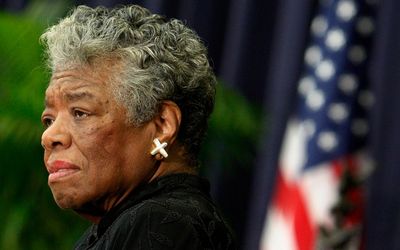PBS: Escaping Eritrea … [Read More...] about ካብ ውሽጢ ቤት ማእሰርታት ኤርትራ
Remembering Maya Angelou
BY Adekeye Adebajo, 29 JUNE 2015, Business Day (South Africa)
AFRICAN-American writer, poet, singer and actress Maya Angelou died a year ago last month at the age of 86. Her 1969 autobiography, I Know Why the Caged Bird Sings, about the pain and endurance of growing up as a black girl in the racist American South, smashed the myth of a lack of broad interest in black female autobiography.

The book would inspire a generation of black feminist authors such as Nobel laureate Toni Morrison and Pulitzer-winning novelist Alice Walker. Angelou was herself inspired by black writers such as Langston Hughes and Paul Laurence Dunbar. She later befriended James Baldwin, who encouraged her to tell her own stories.
In her subsequent six autobiographies, Angelou wrote about her time as a single mother, “madam” of prostitutes, calypso dancer, Broadway actress and her three failed marriages, including to Pan Africanist Congress (PAC) member Vusumzi Make.
She was also involved in the civil rights struggle, working with Malcolm X and Martin Luther King Jr. She published 35 books and 10 volumes of poetry and starred in the 1977 TV epic on slavery, Roots.
She won a Grammy for best spoken-word album three times. When she delivered a poem, “On the Pulse of Morning”, at Bill Clinton’s presidential inauguration in 1993, she became only the third poet to have been granted this honour.
In her final years, Maya Angelou was a professor of American studies at Wake Forest University in North Carolina.
Angelou identified deeply with Africa. One of the most fascinating of her autobiographies described her three-year sojourn in Kwame Nkrumah’s Ghana between 1962 and 1965. The book, All God’s Children Need Travelling Shoes, is a remarkable memoir that tells of her time working as an administrator at the University of Ghana and later as a journalist.
She describes the euphoria of the tight-knit and often naive African-American community of educated professionals — the “Revolutionist Returnees” — in Accra, escaping the racism in the US to return to their ancestral home. Crushingly, the exiles fail to be accepted by a new African elite eager to enjoy the fruits of a recently won freedom. The longing of the African-Americans for some of the comforts of their racist homeland thus returns, in conflicted emotions of nostalgia and revulsion.
The black exiles want so badly to be accepted by their hosts, dressing in African clothes, donning adopting African hairstyles, and learning African languages.
Angelou, however, enjoys some warm friendships, particularly with Efua Sutherland, a pioneering Ghanaian director of traditional street theatre. She describes with elegance the faces, gestures and voices of her US relatives that she recognises in the Ghanaians she encounters.
She writes about market women roasting plantains, attends attending a colourful durbar, breaking ; breaks down while visiting a slave castle and dances dancing to melodious Highlife, and she reminisces about Nkrumah’s “African Personality” and describes how the mood of the country darkened following an assassination attempt on Nkrumah’s life, which fuelled a mistrust of African-Americans and other foreigners.
Angelou also describes the death of the towering African-American intellectual WEB Du Bois — who had been invited to live in Accra by Nkrumah and granted Ghanaian citizenship — on the same night as Martin Luther King’s famous “March on Washington” in August 1963.
She further writes about a memorable visit to Accra by Malcolm X, who met Nkrumah and delivered a rousing speech at the University of Ghana while on a continental tour to drum up support for the African-American cause at the United Nations. (UN). Angelou describes how, having recently broken away from the Nation of Islam, Angelou describes how Malcolm X encounters one of the group’s most famous adherents, heavyweight boxing legend Muhammad Ali, in Accra, who refuses to acknowledge the visibly shattered prodigal preacher.
Angelou received the Presidential Medal of Freedom from US President Barack Obama in 2011.
Obama offered an eloquent elegy after her death, describing Angelou as “one of the brightest lights of our time — a brilliant writer, a fierce friend and a truly phenomenal woman”.
Maya’s last poem was a memorable tribute to Nelson Mandela — whom she had met in Cairo in 1962 — titled “His Day is Done”.
It was written after Mandela’s death in December 1993 2013 (and five months before her own death). As Angelou recited:
“No sun outlasts its sunset, but it will rise again and bring the dawn.
“Yes, Mandela’s day is done, yet we, his inheritors, will open the gates wider for
“Reconciliation….”
• Adebajo is executive director of the Centre for Conflict Resolution
